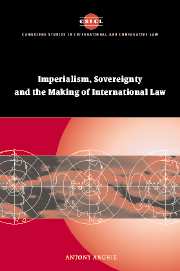34 results
Introduction to the Symposium on J. Benton Heath, “Making Sense of Security”
- Part of
-
- Journal:
- AJIL Unbound / Volume 116 / 2022
- Published online by Cambridge University Press:
- 15 August 2022, pp. 225-229
-
- Article
-
- You have access
- Open access
- HTML
- Export citation
Introduction to the Symposium on the Impact of Indigenous Peoples on International Law
- Part of
-
- Journal:
- AJIL Unbound / Volume 115 / 2021
- Published online by Cambridge University Press:
- 29 March 2021, pp. 116-117
-
- Article
-
- You have access
- Open access
- HTML
- Export citation
Editorial Preface
-
- Journal:
- Asian Journal of International Law / Volume 9 / Issue 1 / January 2019
- Published online by Cambridge University Press:
- 03 January 2019, pp. 153-154
- Print publication:
- January 2019
-
- Article
-
- You have access
- HTML
- Export citation
Introduction to the Symposium on B.S. Chimni, “Customary International Law: A Third World Perspective”
- Part of
-
- Journal:
- AJIL Unbound / Volume 112 / 2018
- Published online by Cambridge University Press:
- 12 November 2018, pp. 290-292
-
- Article
-
- You have access
- Open access
- HTML
- Export citation
32 - Bandung and the Origins of Third World Sovereignty
- from Part V. - Another International Law
-
-
- Book:
- Bandung, Global History, and International Law
- Published online:
- 17 November 2017
- Print publication:
- 30 November 2017, pp 535-551
-
- Chapter
- Export citation
International Law and Its Discontents: Confronting Crises. Edited by Barbara Stark . New York, NY: Cambridge University Press, 2015. Index. Pp. xi, 306. $102, £67.
-
- Journal:
- American Journal of International Law / Volume 111 / Issue 4 / October 2017
- Published online by Cambridge University Press:
- 13 February 2018, pp. 1087-1090
- Print publication:
- October 2017
-
- Article
- Export citation
Politic, Cautious, and Meticulous: An Introduction to the Symposium on the Marshall Islands Case–Corrigendum
- Part of
-
- Journal:
- AJIL Unbound / Volume 111 / 2017
- Published online by Cambridge University Press:
- 26 June 2017, p. 102
-
- Article
-
- You have access
- Open access
- HTML
- Export citation
Politic, Cautious, and Meticulous: An Introduction to the Symposium on the Marshall Islands Case
- Part of
-
- Journal:
- AJIL Unbound / Volume 111 / 2017
- Published online by Cambridge University Press:
- 02 June 2017, pp. 62-67
-
- Article
-
- You have access
- Open access
- HTML
- Export citation
Introduction to Symposium on the Many Lives and Legacies of Sykes-Picot
- Part of
-
- Journal:
- AJIL Unbound / Volume 110 / 2016
- Published online by Cambridge University Press:
- 20 January 2017, pp. 105-108
-
- Article
-
- You have access
- Export citation
3 - ‘Hegemonic international law’ in retrospect
- from I - International law in general
-
-
- Book:
- Making Transnational Law Work in the Global Economy
- Published online:
- 17 November 2010
- Print publication:
- 28 October 2010, pp 19-33
-
- Chapter
- Export citation
14 - On critique and the other
-
-
- Book:
- International Law and its Others
- Published online:
- 20 July 2009
- Print publication:
- 02 November 2006, pp 389-400
-
- Chapter
- Export citation
2 - Finding the peripheries: colonialism in nineteenth-century international law
-
- Book:
- Imperialism, Sovereignty and the Making of International Law
- Published online:
- 05 August 2012
- Print publication:
- 03 January 2005, pp 32-114
-
- Chapter
- Export citation
1 - Francisco de Vitoria and the colonial origins of international law
-
- Book:
- Imperialism, Sovereignty and the Making of International Law
- Published online:
- 05 August 2012
- Print publication:
- 03 January 2005, pp 13-31
-
- Chapter
- Export citation
Acknowledgements
-
- Book:
- Imperialism, Sovereignty and the Making of International Law
- Published online:
- 05 August 2012
- Print publication:
- 03 January 2005, pp xiv-xv
-
- Chapter
- Export citation
Frontmatter
-
- Book:
- Imperialism, Sovereignty and the Making of International Law
- Published online:
- 05 August 2012
- Print publication:
- 03 January 2005, pp i-vi
-
- Chapter
- Export citation
4 - Sovereignty and the post-colonial state
-
- Book:
- Imperialism, Sovereignty and the Making of International Law
- Published online:
- 05 August 2012
- Print publication:
- 03 January 2005, pp 196-244
-
- Chapter
- Export citation
Contents
-
- Book:
- Imperialism, Sovereignty and the Making of International Law
- Published online:
- 05 August 2012
- Print publication:
- 03 January 2005, pp vii-x
-
- Chapter
- Export citation
Index
-
- Book:
- Imperialism, Sovereignty and the Making of International Law
- Published online:
- 05 August 2012
- Print publication:
- 03 January 2005, pp 342-356
-
- Chapter
- Export citation

Imperialism, Sovereignty and the Making of International Law
-
- Published online:
- 05 August 2012
- Print publication:
- 03 January 2005
Table of cases
-
- Book:
- Imperialism, Sovereignty and the Making of International Law
- Published online:
- 05 August 2012
- Print publication:
- 03 January 2005, pp xvi-xviii
-
- Chapter
- Export citation



